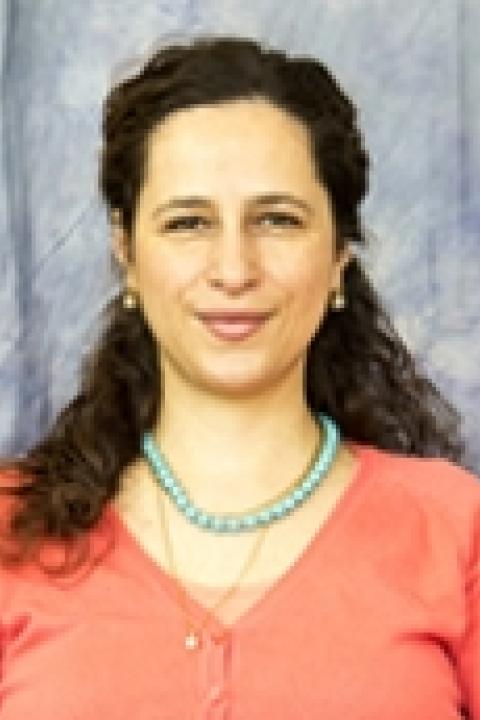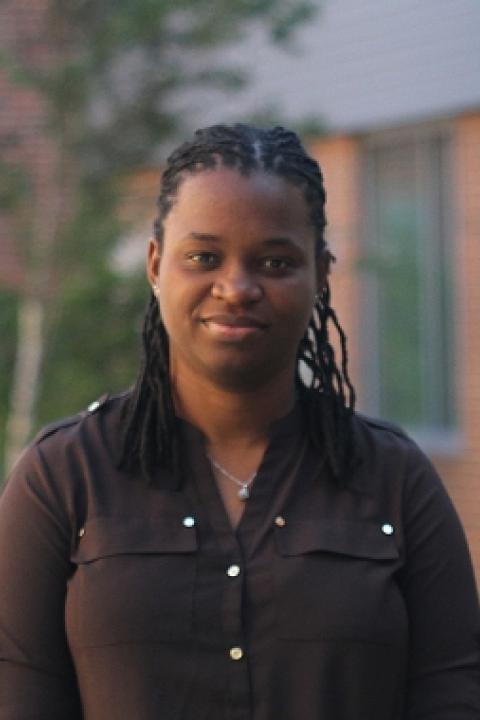What is the elementary/middle school option in mathematics education?
This program is tailored to students who want to teach mathematics at the elementary or middle school level. It provides a strong foundation in mathematics with current pedagogical approaches and insightful study of student learning. Mathematics education students have the advantage of working directly within the mathematics department and coordinating with the education department to obtain New Hampshire teacher certification.
Why study mathematics education at UNH?
You’ll work alongside accomplished mathematicians, statisticians, and educators who are professionally active. You’ll gain an understanding of higher level mathematics, the mathematics taught in elementary and middle school classrooms, and the process of teaching mathematics. You’ll have the opportunity to pursue an accelerated master’s degree leading to teacher certification in just five years. You’ll enjoy many small, specialized classes and a variety of field-based experiences. Our professors have won prestigious honors, including a Grammy Award and a MacArthur “genius” grant. This department has produced many winners of the prestigious Department of Defense SMART Scholarship.
Potential careers
- Curriculum supervisor/developer
- Educational software developer
- Mathematics education consultant
- Mathematics educator in government/research/academia
- Mathematics teacher
- Mathematics textbook writer/editor/publisher
Curriculum & Requirements
Beginning in the 2022/23 academic year, the Math Education Major: Elementary/Middle School Education K-8 option will no longer be accepting new students. Current students will continue to have access to the same high-quality education and resources until they graduate.
This professional degree program prepares students for teaching mathematics at the elementary and/or middle school level. The program is coordinated with the education department's teacher certification programs. For the elementary option, full certification requires the five-year program. Students may complete the degree requirements for middle school option with full teacher certification in either four or five years.
Students electing the four-year option leading to middle school certification must plan for one semester of student teaching in their senior year; this requires careful planning with your program adviser to accommodate the scheduling of required MATH courses.
The five-year program for either option includes a year-long teaching internship in the fifth year. The internship requires admission into a UNH Department of Education graduate program that leads to certification. See Education, College of Liberal Arts.
| First Year | ||
|---|---|---|
| Fall | Credits | |
| MATH 425 | Calculus I | 4 |
| PHYS 406 | Introduction to Modern Astronomy | 4 |
| Discovery Course | 4 | |
| Inquiry Course | 4 | |
| MATH 400 | Freshman Seminar | 1 |
| Credits | 17 | |
| Spring | ||
| MATH 426 | Calculus II | 4 |
| MATH 445 or CS 410P or CS 410C | Mathematics and Applications with MATLAB or Introduction to Scientific Programming/Python or Introduction to Scientific Programming/C | 4 |
| ENGL 401 | First-Year Writing | 4 |
| Discovery Course | 4 | |
| Credits | 16 | |
| Second Year | ||
| Fall | ||
| MATH 539 | Introduction to Statistical Analysis | 4 |
| MATH 621 | Number Systems for Teachers | 4 |
| EDUC 500 | Exploring Teaching | 4 |
| Discovery Course | 4 | |
| Credits | 16 | |
| Spring | ||
| MATH 531 | Mathematical Proof | 4 |
| MATH 545 or MATH 645 | Introduction to Linear Algebra or Linear Algebra for Applications | 4 |
| MATH 622 | Geometry for Teachers | 4 |
| Discovery Course | 4 | |
| Credits | 16 | |
| Third Year | ||
| Fall | ||
| MATH #623 | Probability and Statistics for Teachers | 4 |
| MATH 700 | Introduction to Mathematics Education | 4 |
| MATH 760 | Geometry | 4 |
| Discovery Course | 4 | |
| Credits | 16 | |
| Spring | ||
| MATH 625 | 4 | |
| MATH 703 or MATH 709 | Teaching of Mathematics in Grades K-5 or Teaching of Mathematics in Grades 6-12 | 4 |
| MATH 790 | Historical Foundations of Mathematics | 4 |
| Discovery Course | 4 | |
| Credits | 16 | |
| Fourth Year | ||
| Fall | ||
| MATH 797 or MATH 799 | Senior Seminar or Senior Thesis | 4 |
| EDUC 605 | Educational Perspectives in Critical Times | 4 |
| Writing Intensive Course | 4 | |
| Elective Course | 4 | |
| Credits | 16 | |
| Spring | ||
| EDUC 701 | Human Development & Learning: Cultural Perspectives | 4 |
| Writing Intensive Course | 4 | |
| Elective Course | 4 | |
| Elective Course | 4 | |
| Credits | 16 | |
| Total Credits | 129 | |
Degree Requirements
All Major, Option and Elective Requirements as indicated.
*Major GPA requirements as indicated.
Major Requirements
In all courses used to satisfy the requirements for its major programs, the Department of Mathematics and Statistics requires that a student earn a grade of C- or better and have an overall grade-point average of at least 2.00 in these courses.
For teacher licensure a grade of B- or better is required in all Education courses.
Requirements for admission to student teaching include receiving credit for EDUC 500 and a minimum cumulative 2.8 GPA.
| Code | Title | Credits |
|---|---|---|
| Required MATH Courses | ||
| MATH 425 | Calculus I | 4 |
| MATH 426 | Calculus II | 4 |
| MATH 445 | Mathematics and Applications with MATLAB | 4 |
| or CS 410P | Introduction to Scientific Programming/Python | |
| or CS 410C | Introduction to Scientific Programming/C | |
| MATH 531 | Mathematical Proof | 4 |
| MATH 539 | Introduction to Statistical Analysis | 4 |
| MATH 545 | Introduction to Linear Algebra | 4 |
| or MATH 645 | Linear Algebra for Applications | |
| MATH 621 | Number Systems for Teachers | 4 |
| MATH 622 | Geometry for Teachers | 4 |
| MATH #623 | Probability and Statistics for Teachers | 4 |
| MATH 625 | 4 | |
| MATH 700 | Introduction to Mathematics Education | 4 |
| MATH 703 | Teaching of Mathematics in Grades K-5 | 4 |
| or MATH 709 | Teaching of Mathematics in Grades 6-12 | |
| MATH 760 | Geometry | 4 |
| MATH 790 | Historical Foundations of Mathematics | 4 |
| Capstone: Select one of the following | ||
| MATH 797 | Senior Seminar | 4 |
| MATH 799 | Senior Thesis | 2 or 4 |
| Other Required Courses | ||
| PHYS 406 | Introduction to Modern Astronomy | 4 |
| EDUC 500 | Exploring Teaching | 4 |
| EDUC 605 | Educational Perspectives in Critical Times | 4 |
| EDUC 701 | Human Development & Learning: Cultural Perspectives | 4 |
| Total Credits | 78-80 | |
Note: EDUC 703F Teaching Elementary School Science, EDUC 703M Teaching Elementary Social Studies, EDUC 706 Teaching & Learning Literacy in the Elementary Classroom, and EDUC 751A Inclusive Elementary Education: Literacies and Learning for Diverse Learners are requirements for K-6 or K-8 certification.
EDUC 706 Teaching & Learning Literacy in the Elementary Classroom must be completed prior to the Internship (EDUC 900A Internship and Seminar in Teaching and EDUC 901A Internship and Seminar in Teaching).
Mathematics Concepts, Practices, and Curriculum. Well-prepared beginning teachers of mathematics:
- Demonstrate robust knowledge of mathematical and statistical concepts that underlie what they encounter in teaching of K-8 or secondary mathematics.
- Engage in appropriate mathematical and statistical practices, and use technological tools to solve mathematical problems, and incorporate educational technology in their teaching.
- Analyze and interpret mathematical curricula, assessments, and standards documents.
- Analyze and interpret students’ mathematical work.
Pedagogical Knowledge and Practices for Teaching Mathematics. Well-prepared beginning teachers of mathematics:
- Demonstrate strong foundations of pedagogical knowledge, and effective and equitable mathematics teaching practices.
- Construct instructional explanations, develop tasks, lesson plans and unit plans, that advance students’ mathematical understanding.
- Recognize common patterns of student thinking related to particular mathematical topics, and articulate ways of supporting students’ mathematical thinking.
Productive dispositions. Well-prepared beginning teachers:
- Demonstrate positive and productive dispositions toward mathematics as a discipline, towards students as learners of mathematics and towards teaching mathematics in ways that support students’ sense making, understanding, and reasoning.










